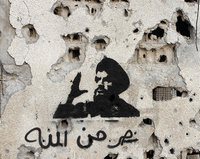In what has become a tragically predictable cycle, a new war breaks out every few years in the heart of the Middle East. And a quick scan of the region today points to a dizzying number of possibilities for potential conflicts that might erupt. Yet, most people in the region generally agree about where the next major clash will start and which armies it will involve -- at least as its principal combatants. As for when the fighting will begin, nobody knows that with certainty. But the drumbeat of warning signs that the moment could come soon is growing louder by the day.
The conventional wisdom tells us that the next war will most likely bring a sequel to the 2006 conflict that pitted Israel against Hezbollah across the Lebanon border. Talk that open hostilities are imminent, prompted by a series of troubling incidents, has become so pervasive that Egyptian Foreign Minister Ahmed Abu Gheit found it necessary to send a calming message to the people of south Lebanon, saying, "No war is looming in the horizon." But his words contained more than a balm to soothe frayed nerves. They also carried a warning to Hezbollah and its sponsors in Iran and Syria. In an interview with the pan-Arab newspaper Al-Hayat, Abu Gheit noted there would be no war with Israel, "as long as there has not been any operation to launch missiles or cross the border."
Concerns about a renewal of the conflict extend beyond the Middle East. U.N. Secretary-General Ban Ki-Moon is just one of the many people who have expressed fears that a new war could break out.

